
The crash in oil prices has sparked calls by some for a federal bailout of the oil industry.
A rescue from Washington is unlikely in an election year, but independent oil producers aren't waiting around to see where Congress stands.
"The industry is not looking for a bailout from Washington, D.C.," Neal Kirby, director of public affairs of the Independent Petroleum Producers of America, emphatically told CNNMoney.
The organization, which represents thousands of small and medium-sized producers, said it's actually looking for the opposite of a rescue.
"We're asking the federal government to get out of the way and allow America's free-market principles to work," the group said, referring to government support for competitors like renewable energy sources like solar and wind.
The free market has been inflicting lots of pain on the oil industry these days. The plunge in crude prices below $30 a barrel has caused dozens of oil companies to succumb to bankruptcy.
Unless oil prices make a remarkable and sustainable recovery, many more are likely to follow suit, costing thousands more jobs.
Related: Why you should worry about cheap oil
Greg Valliere, chief global strategist at Horizon Investments, is surprised Congress hasn't seemed to notice the oil crash, calling it a looming crisis.
"The shocking drop in the price of oil will soon get Washington's attention, as unemployment spikes in Texas, Oklahoma, the Dakotas -- and as bankruptcies threaten to spiral out of control," Valliere wrote in a recent client note.
To be sure, there doesn't appear to be an actual bailout in the works for the oil industry to turn down. But talk about a federal rescue grew louder this month as crude oil crashed below $35 a barrel to as low as $26 this week.
John Kilduff, founding partner of energy hedge fund Again Capital, wrote a CNBC column making the case for a bailout. He said it should include payments to oil producers that shut down production, loan guarantees, revamping the bankruptcy code and having government agencies buy land with drilled-but-uncompleted wells.
"It is time to send out an S.O.S., before it's too late," Kilduff wrote, adding that his version of S.O.S. stands for "Save Our Shale" industry.
Related: Stocks: How scared should we be?
However, many lawmakers don't want to be viewed as helping Big Oil -- especially not when a presidential election hangs in the balance. There may also be bailout fatigue given the unpopular rescues of the banking and auto industries in 2008 and 2009.
"Most politicians don't want to talk about aid to the energy industry -- certainly not Democrats, who view oil producers as only slightly less evil than bankers," Valliere wrote.
Buddy Clark, head of the energy practice group at Houston law firm Haynes & Boone, isn't surprised about the lack of interest from producers, who tend to be fiercely independent.
"It would have too many strings attached to it," said Clark, adding that no one wants to "get in bed" with the federal government.


